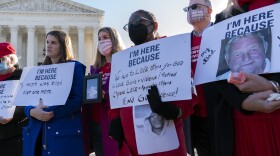Krishnadev Calamur
Krishnadev Calamur is NPR's deputy Washington editor. In this role, he helps oversee planning of the Washington desk's news coverage. He also edits NPR's Supreme Court coverage. Previously, Calamur was an editor and staff writer at The Atlantic. This is his second stint at NPR, having previously worked on NPR's website from 2008-15. Calamur received an M.A. in journalism from the University of Missouri.
-
The U.S. Court of Appeals for the Federal Circuit granted the Trump administration's request to temporarily put on hold the New York-based Court of International Trade judgment that struck down President Trump's tariffs.
-
It's the first major gun case at the court since 2008, when the court ruled that the Second Amendment right to keep and bear arms grants individuals the right to keep a gun at home for self-defense.
-
The Justice Department wants the high court to put the restrictive law on hold during ongoing legal challenges. The U.S. government says the legislation is unconstitutional.
-
"If the Democrats can do it, the Republicans can do it," Supreme Court Justice Stephen Breyer told NPR's Nina Totenberg.
-
The court's six conservative justices said the CDC exceeded its authority by issuing the two-month pause on evictions in much of the country.
-
Senate Judiciary Committee Democrats pressed Amy Coney Barrett about her criticism of the legal opinion that saved Obamacare. But she noted that case differs from the one before the court on Nov. 10.
-
Attackers accessed parts of the computer network that contain personal and medical information, but there is no evidence they accessed or acquired any personal or medical information, UCLA said.
-
The provision was politically toxic when it was first proposed in 2009. Julie Rovner of Kaiser Health News says many medical groups, including the AMA, have long recommended the move.
-
The comedian testified in 2005 he got the sedative with the intent of giving it to women with whom he wanted to have sex.
-
Belle Gibson's claims that she cured her terminal brain cancer solely through diet and lifestyle spawned a wellness empire, an award-winning app, a recipe book and a large online following.






